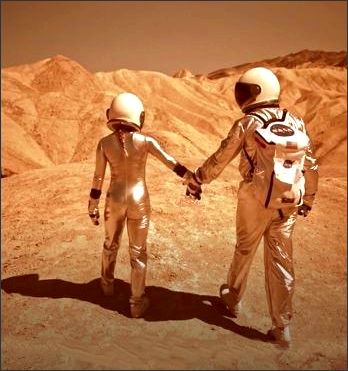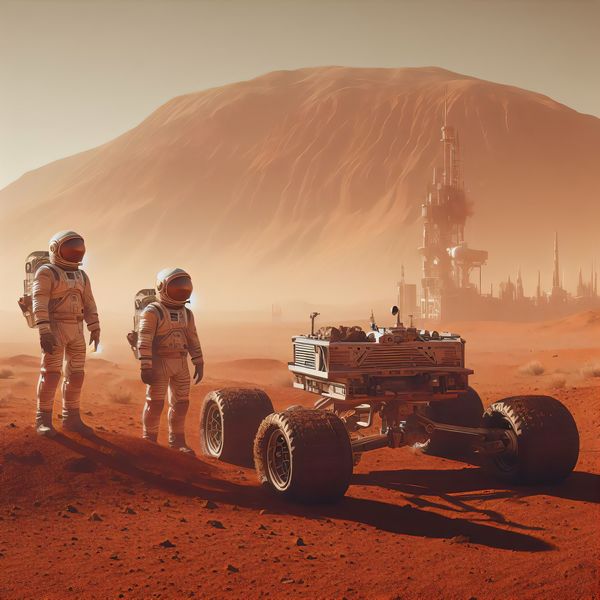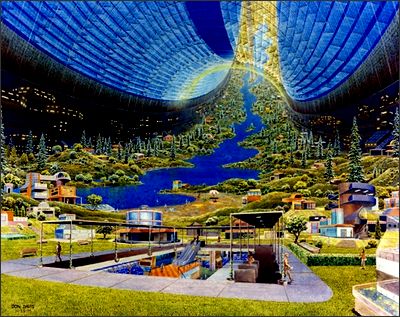
The Future of Humans in Space
by Sylvia Engdahl
This essay consists of the first half of my essay "The Future of Humankind in the Cosmos," which appeared in the original edition of my ebook The Future of Being Human Other Essays but has now been split in two. It deals with my personal view of our future progress in exploration and settlement of our own solar system. The second half, dealing with interstellar colonization and the possibility of contact with alien civilizations, appears in the current edition of From This Green Earth: Essays on Looking Outward.
*
My view of the relatively near-term future on Earth is described in my essay "The Future of Being Human” and several others. As I have said there, I believe life won't be as different as most current speculation suggests. Artificial intelligence (AI) will alter many aspects of it, but will never take over from humans. We aren't going to become shapeshifters or cyborgs, though we will benefit from genetic and neurotechnological advances where they are useful. No matter how many new technologies are developed, people will have the same underlying wants and needs that they do now. Couples will still fall in love. Their feelings about their families will remain unchanged, as will their sense of what's important to them, however unlike today's their appearance and activities may be.
This will be true, I believe, as far into the future as it is possible to imagine. Human nature isn't going to change. Whatever it is that makes us human--which is at present beyond our understanding--is not subject to transformation by time. But as far as humankind as a whole is concerned, there will be one major step in our evolution that will redefine our status forever. We will become a spacefaring species.

Large stations in orbit will be essenial to the preservation of Earth's environment.
The expansion of our civilization into space is vital if we are to survive indefinitely. There are four major reasons: first, because we are vulnerable to a number of catastrophes, human-caused or natural, as long as we are confined to a single planet. Second, because sooner or later Earth will run of resources, no matter what is done to conserve them; the claim that they can be made sustainable forever is a dangerous illusion. Third, because like all species we have a built-in drive to increase the population, and attempts to frustrate it would lead only to setbacks such as war, pandemics, or mass starvation. And fourth, because throughout human history exploration of new regions has led to renewed creativity and intellectual progress; in time we would decline from boredom if we never moved outward, even if not from the other perils.
In addition to these survival imperatives, we need to become spacefaring because it will bring great benefits to Earth. Initially, the development of space-based solar power will solve the energy crisis; bring about a significant reduction in atmospheric pollution; raise developing nations out of poverty; and provide enough cheap power to desalinate sea water, a process that will be necessary if climate change requires an increase in irrigation, as well as to meet the needs of a growing population. Next, manufacturing in orbit, using raw materials from the moon and asteroids, will result in further reduction of pollution, plus lowered cost of minerals and products imported to Earth. And in the distant future, hunger and poverty will be relieved by enabling population growth on other worlds.
Eventually, settlement of such worlds will reduce the pressures that result from confinement of our species to a single planet with finite space and finite resources. This in turn will lessen conflict and, ultimately, bring an end to war. Once sufficient material resources are available to all nations and a commitment is made to the challenge of establishing large-scale colonies, the reasons for war will disappear, although it will always be necessary to maintain a defense against terrorists and attempted dictatorships. Only expansion beyond Earth can bring this about. If we fail to make the effort then sooner or later, our species will die out.

The earliest colonists on Mars will live in a barren world where they must wear spacesuits whenever they venture outside their living quarters. Comforts such as domed cities will come later.
The first step in becoming spacefaring was, of course, the 1969 landing on the moon, which at the time was rightly called a major evolutionary milestone. Yet despite its symbolic significance, it proved to be more or less of a false dawn, although we have made important advances in space technology since then and I believe no support for faster progress should have been expected. As to why, fifty years after setting foot on the moon, we have neither returned there nor gone further into space, see the first three essays in my book From This Green Earth (which are also available online).
The true turning point in evolution will be the utilization of resources from space, the moon, and eventually the asteroids to benefit Earth, beginning with the construction of solar power satellites. By far the best solution to the energy shortage and pollution on Earth is to beam down solar power collected by satellites in space. This has been proposed since the 1970s but has been stalled by financial and political problems. It is now desperately needed for adaptation to climate change and to provide electricity to developing regions where millions of people are still living without it, as well as to meet the expanding demand for power in the industrialized nations. Hopefully, opposition to the environmental damage associated with current energy sources will finally bring about its implementation. China and Japan, which are already working on it, may lead the way.
The next step will be a large privately-owned space station, and perhaps a permanent base on the moon. This will be a gradual process, but by the end of the twenty-first century it will significantly increase resources, and products derived from them, available on Earth, as well as reducing pollution of the atmosphere. Moreover, working in space will provide experience essential to the eventual establishment of colonies on distant worlds, as well as enable entrepreneurs to earn the money to finance them.
Perhaps even before major orbital activity will come human exploration of the moon and Mars and the establishment of bases there. One or more expeditions--the first one already planned by Elon Musk--will go to Mars before the middle of this century and a small settlement may be established by its end. The speed at which this occurs depends on how soon the problems due to the effect of prolonged zero or low gravity on the human body can be solved. Before many people can go it will be necessary to develop ships with artificial gravity, but even with them, it may not be possible for those who have spent much time on Mars to return to Earth. They may not care; after all, most early settlers of America didn't expect to go back to Europe.

Exploring Mars wil be a long-term proect even after there is a colony there.
I don't believe there will be a large self-supporting colony on Mars, one that can survive without supplies from Earth, until the twenty-second century, but it will surely be established by then, and will continue to grow. If it proves possible to produce large quantities of lightweight materials such as graphene--which is 100 times stronger than steel and almost transparent--through nanotechnology, numerous domes can be easily constructed by self-replicating robots. (I don't think they'll be human-shaped robots, as other shapes might be more useful; but I find that NASA has already designed one.) In that case, a breathable atmosphere won't be necessary; but on the other hand, it may be feasible to terraform Mars. Many proposals for doing so have been developed, and it would eliminate the need for artificial life support and facilitate agriculture, even if a large population can survive without change to the natural environment. However, terraforming will be a slow process, and by the time it is complete the early settlers may be accustomed to their way of life and have no desire to change it. So whether it's worthwhile may be a question of how much ongoing immigration from Earth is expected.
The other planets in our solar system are not suitable for colonization, although some of their moons are promising and in the late twenty-first or early twenty-second century exploration of them, first by robots and later by humans, will begin. Almost certainly we will mine the asteroids, which are rich in minerals needed on Earth and for construction of facilities in orbit. How soon this happens will depend on the progress of technology, but it will start in this century and could be well underway even before the settlement of Mars.
At some point we will build orbital colonies. It has been believed since the 1970s that large colonies could be constructed in Earth orbit with materials from the moon--little worlds with the living space, including parks containing plants and trees, on the inside surface of huge orbital structures. Many people (and I was among them) thought this should be done soon, before the colonization of Mars. Since then it has been realized that it's too big a project to be accomplished easily, and it is not a high priority because there is no short-term financial incentive. With the AI that will be available to process extraterrestrial resources, there will be no need for many people to work in orbit. But in the far future when more room is needed for population growth, orbital colonies will be essential. Living conditions in them will be much better than in crowded cities on Earth, and eventually they may make it possible to abandon large cities and restore much of Earth's natural beauty.

Orbital habitats would have grass and trees, and would be pleasant places to live.
Before that happens we may aim for the stars with interstellar probes and perhaps primitive starships. As soon as a means of propulsion is found that can reach the nearest star within a century or less, robots will be sent and explorers may follow, even if it means they must travel in frozen sleep or raise new generations before they reach the destination. But because it will take up to another century for messages sent back from them to reach Earth, this won't be done on a large scale. It's unlikely that we'll attempt to colonize exoplanets until we have faster-than-light (FTL) starships. To relieve population pressure it will be easier to construct orbital colonies surrounding not merely Earth, but our sun.
Nevertheless, the search for a means of FTL travel will continue. Humankind has always dreamed of reaching the stars,and whether or not there is any practical need to do so, that dream won't be abandoned. For my thoughts about this, see my book From This Green Earth: Essays on Looking Outward. I feel sure that sooner or later, we will explore the vast universe beyond this solar system and take our place among whatever other sapient species may inhabit it.
Copyright 2019. 2024 by Sylvia Engdahl
All rights reserved.
This essay is included in my ebook The Future of Being Human and Other Essays